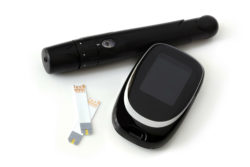 Steglatro and other SGLT2 inhibitor medications have been recently linked to a life threatening flesh eating bacterial infection, which has already spurred a warning from the FDA.
Steglatro and other SGLT2 inhibitor medications have been recently linked to a life threatening flesh eating bacterial infection, which has already spurred a warning from the FDA.
According to WebMD, the agency announced on Aug. 30, 2018 that it had received reports of cases of SGLT2 inhibitors linked to Fournier’s gangrene, a potentially fatal condition.
Also known as necrotizing fasciitis of the genital area, Fournier’s gangrene attacks the tissues under the skin surrounding the muscles, nerves, fat, and blood vessels in this area of the body. Gangrene occurs when tissue dies if blood flow is blocked or from bacterial infection, with this particular ailment affecting the genital region of both male and female patients.
In male patients, Fournier’s gangrene develops in the scrotum, penis, and perineum. For female patients, the infection appears in the anus and vulva. Fournier’s gangrene can also extend into the thighs, stomach, and chest in all patients.
The condition is quite rare and affects men more commonly than women, but children may also be vulnerable in some cases. Fournier’s gangrene can develop from a cut or some other entry point that allows the bacteria access to the body.
This flesh eating bacterial infection can be potentially fatal, and has been recently reported in conjunction with SGLT2 inhibitors like Steglatro.
SGLT2 inhibitors work by expelling excess blood sugar through urination, which helps keeps glucose levels at a healthy level. These medications have been on the market since 2013 and have been prescribed to millions of patients. In 2017, approximately 1.7 million patients received an SGLT2 inhibitor prescription to treat their type-2 diabetes, which makes its reported correlation with Fournier’s gangrene very troubling.
Overview of SGLT2 Inhibitor and Fournier’s Gangrene Correlation
The FDA stated that there were 12 cases of Fournier’s gangrene reported in users of SGLT2 inhibitors between March 2013 to May 2018, consisting of five women and seven men.
These patients reportedly ranged from 38 to 78 years old, with the infection reportedly developing a little over nine months after being prescribed the SGLT2 inhibitors and lasting from seven days to 25 months.
The FDA’s warning further stated that all 12 patients were hospitalized and had to undergo surgery to remove infected tissues, with some patients needing more than one surgery and one patient requiring skin grafting. In addition, four patients had developed potentially fatal conditions like diabetic ketoacidosis, acute kidney injury, and septic shock.
One patient died, and two were transferred to rehabilitation hospitals. The FDA is now requiring that Steglatro and other SGLT2 inhibitor warning labels include information about the risk of this flesh eating bacterial infection.
It is important to note that Fournier’s gangrene had only six cases reported in the last 30 years in conjunction with other type-2 diabetes drugs, which further highlights the alleged correlation.
SGLT2 inhibitor patients who develop a sudden tenderness, redness, or swelling in their genital area and have a high fever may be developing this disease. The flesh-eating bacterial infection can quickly get worse, so patients should seek medical help immediately. The FDA is currently encouraging patients to report any SGLT2 inhibitor side effects to the FDA MedWatch program.
Join a Free Diabetes Medications & Flesh-Eating Infection Lawsuit Investigation
The type-2 diabetes medications linked to the flesh-eating infection include:
- Invokana
- Invokamet/Invokamet XR
- Farxiga
- Xigduo XR
- Qtern
- Jardiance
- Glyxambi
- Synjardy/Synjardy XR
- Steglato
- Segluromet
- Steglujan
If you or a loved one took one of the type-2 diabetes medications listed above and suffered from a flesh-eating genital infection, you may qualify to join this diabetes medication lawsuit investigation. Fill out the FREE form on this page for more information.
ATTORNEY ADVERTISING
Top Class Actions is a Proud Member of the American Bar Association
LEGAL INFORMATION IS NOT LEGAL ADVICE
Top Class Actions Legal Statement
©2008 – 2026 Top Class Actions® LLC
Various Trademarks held by their respective owners
This website is not intended for viewing or usage by European Union citizens.
Get Help – It’s Free
Join a Free Diabetes Medications & Flesh-Eating Infection Lawsuit Investigation
If you qualify, an attorney will contact you to discuss the details of your potential case at no charge to you.
PLEASE NOTE: If you want to participate in this investigation, it is imperative that you reply to the law firm if they call or email you. Failing to do so may result in you not getting signed up as a client or getting you dropped as a client.
E-mail any problems with this form to:
[email protected].
Oops! We could not locate your form.












